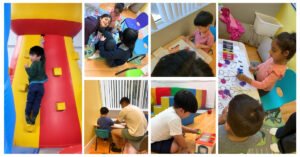The Nutrition-Therapy Connection: Fueling Your Child’s Success with Pediatric Therapist
Vancouver’s leading pediatric therapists have uncovered a game-changing truth: what your child eats directly impacts how well they respond to therapy. Recent research reveals that essential nutrients like omega-3 fatty acids, iron, zinc, and vitamin D don’t just support physical health—they actively influence brain structure, neurotransmitter function, and behavioral regulation, making them critical partners in your child’s therapeutic journey.
Children with iron deficiency often struggle with fatigue and concentration issues that can mask their true potential during therapy sessions. When these nutritional gaps are addressed, parents frequently report dramatic improvements in their child’s ability to focus, follow instructions, and engage actively in occupational therapy activities. Similarly, adequate omega-3 intake has been linked to improved attention span and reduced behavioral challenges—characteristics that directly enhance therapy effectiveness.
The practical implementation of nutrition-focused therapy has transformed treatment protocols across Vancouver. Modern pediatric therapy clinics now routinely include nutrition screening as part of comprehensive assessments, identifying deficiencies that might be limiting therapeutic progress. For example, a child struggling with sensory processing issues might show significant improvement when vitamin D levels are optimized, as this nutrient plays a crucial role in nervous system development and function.
Evidence-based dietary recommendations for therapy enhancement include emphasizing whole foods rich in brain-supporting nutrients: fatty fish for omega-3s, lean meats and leafy greens for iron, nuts and seeds for zinc, and fortified foods for vitamin D. Conversely, reducing processed foods, artificial additives, and excessive sugars can minimize behavioral dysregulation that interferes with learning and skill development. Many Vancouver families report that combining these nutritional strategies with their child’s regular therapy sessions creates a synergistic effect that accelerates progress and improves overall well-being.
Sibling Champions: Transforming Family Dynamics Through Inclusive Support
One of the most significant innovations in Vancouver pediatric therapy involves recognizing that siblings aren’t just bystanders—they’re powerful allies who can dramatically enhance therapeutic outcomes when properly supported and engaged. Progressive therapy clinics are implementing structured sibling support programs that transform potential resentment and confusion into empathy, understanding, and active participation in their brother or sister’s development journey.
Psychoeducation for siblings has become a cornerstone of family-centered therapy approaches. Age-appropriate explanations help siblings understand their brother or sister’s unique challenges and strengths, reducing fear and misconceptions while fostering genuine empathy. For instance, when a 10-year-old learns that their sibling’s sensory processing challenges aren’t “being difficult” but rather a neurological difference requiring support, their entire perspective shifts from frustration to understanding.
Vancouver therapy centers are creating sibling support groups where children can connect with peers facing similar family situations. These gatherings normalize their experiences, provide safe spaces to express complex emotions, and offer practical strategies for supporting their siblings at home. Children report feeling less isolated and more equipped to handle challenging situations when they realize other families face similar dynamics.
Family systems approaches now actively incorporate sibling perspectives into therapy planning and implementation. This might involve teaching siblings how to use visual supports their brother or sister relies on, including them in structured play activities that reinforce therapy goals, or helping them develop communication strategies that reduce conflict and promote cooperation. When siblings become knowledgeable partners rather than confused observers, the entire family system becomes more supportive and therapeutic outcomes improve significantly.
Mastering Transitions: Smooth Pathways to New Opportunities

Transitions—whether starting therapy, changing schools, or moving to new developmental stages—can be the most challenging aspects of a child’s therapeutic journey. Vancouver’s pediatric therapy specialists have developed comprehensive transition planning protocols that transform potentially stressful changes into opportunities for growth and increased independence.
Individualized transition plans begin weeks or even months before major changes occur. These detailed roadmaps include visual schedules, social stories, and graduated exposure strategies that help children understand and prepare for new routines, environments, and expectations. For children with learning differences, this preparation is particularly crucial, as unexpected changes can trigger anxiety responses that interfere with adaptation and learning.
The gradual exposure approach has proven especially effective for Vancouver families. Rather than abrupt transitions, children experience step-by-step introductions to new settings. This might involve visiting a new school during quiet periods, meeting teachers before the school year starts, or practicing new routines at home before implementing them elsewhere. Each small step builds confidence and familiarity, reducing anxiety and increasing the likelihood of successful adaptation.
Parent and sibling involvement in transition planning ensures consistent support across all environments. Families learn specific strategies for maintaining routines, providing emotional support, and recognizing signs of transition stress. When transitions are approached as team efforts rather than individual challenges, children feel more secure and supported, leading to smoother adjustments and continued therapeutic progress. Many Vancouver families report that well-planned transitions actually strengthen family bonds and increase their child’s confidence in handling future changes.
Evidence-Based Excellence: Personalized Interventions for Learning Differences
Vancouver’s pediatric occupational therapists are at the forefront of implementing cutting-edge, evidence-based interventions specifically designed for children with learning differences such as ADHD, dyslexia, and sensory processing challenges. These targeted approaches recognize that each child’s neurological profile is unique, requiring personalized strategies that build on strengths while addressing specific areas of need.
Sensory integration therapy has evolved significantly, incorporating the latest research on how sensory processing affects learning, behavior, and social interaction. Modern approaches use carefully calibrated sensory experiences to help children develop more effective processing strategies. For example, children with tactile sensitivities might engage in graduated touch experiences that gradually increase their tolerance while building body awareness and motor planning skills.
Executive function training represents another breakthrough area, directly targeting the cognitive skills that underlie academic success and daily independence. These interventions focus on developing attention regulation, working memory, cognitive flexibility, and inhibitory control through engaging, game-like activities. Children learn practical strategies for organizing their thoughts, managing time, controlling impulses, and adapting to changing demands—skills that transfer directly to classroom and home environments.
Task analysis and environmental modifications ensure that interventions connect meaningfully to real-world functioning. Therapists break complex skills into manageable components, teaching each step systematically while modifying environments to support success. This might involve creating visual supports for homework routines, designing sensory-friendly study spaces, or teaching self-advocacy skills that help children request needed accommodations. The goal is always functional independence—helping children develop skills they can use effectively across different settings and situations.
Building Lifelong Skills: Preparing Teens for Independence
As children with learning differences transition into adolescence, Vancouver’s pediatric therapy services are evolving their approaches to focus on independence preparation and life skills development. This crucial phase of pediatric behavioral therapy emphasizes practical skills that will serve these young people throughout their adult lives, from employment readiness to relationship building and self-advocacy.
Vocational exploration and workplace skills have become central components of adolescent therapy programs. Therapists work with teens to identify their strengths and interests, then develop specific skills needed for success in potential career paths. This might include practicing interview skills, learning workplace communication styles, understanding professional etiquette, and developing strategies for managing sensory challenges in work environments. Real-world practice opportunities, such as volunteer positions or internships, allow teens to apply these skills while building confidence and independence.
Social communication and relationship skills receive focused attention during the teenage years, as peer relationships become increasingly complex and important. Therapy sessions address topics like reading social cues, understanding boundaries, managing conflict effectively, and building meaningful friendships. For teens with learning differences, these skills don’t always develop naturally, making explicit instruction and practice essential for successful social integration and emotional well-being.
Self-advocacy and independence planning prepare teenagers to understand their own needs and communicate them effectively in future educational, workplace, and community settings. This includes helping teens identify their learning differences as strengths rather than limitations, teaching them to request appropriate accommodations, and developing problem-solving strategies they can use independently. Many Vancouver therapy programs now include transition planning that extends into early adulthood, ensuring young people have the support they need as they navigate college, employment, and independent living challenges.
The Kidstart Advantage: Leading Burnaby’s Pediatric Therapy Innovation
These comprehensive, family-centered approaches to pediatric behavioral therapy require exceptional expertise and resources that go far beyond traditional clinical services. Kidstart Pediatric Therapy has positioned itself as Burnaby’s premier provider of innovative, evidence-based interventions that address the whole child within the context of their family system, setting new standards for therapeutic excellence in Metro Vancouver.
The integrated service model that Kidstart employs ensures that nutrition guidance, family support, transition planning, and specialized interventions work together seamlessly to maximize therapeutic outcomes. Rather than addressing challenges in isolation, Kidstart’s team coordinates across all aspects of a child’s development, creating comprehensive support systems that enhance both immediate progress and long-term success. Families consistently report that this holistic approach reduces stress, improves communication, and creates sustainable positive changes that extend far beyond the therapy clinic.
Continuous professional development and evidence-based practice keep Kidstart’s therapists at the forefront of pediatric behavioral therapy advancement. The team regularly participates in specialized training, conducts outcome research, and implements proven innovations that provide genuine benefits for children and families. This commitment to excellence ensures that Kidstart clients receive the most effective interventions available while avoiding experimental approaches that could compromise progress or waste valuable time and resources.
The family partnership approach that defines Kidstart’s service delivery recognizes that parents and siblings are essential team members whose knowledge, insights, and support directly influence therapeutic success. Through comprehensive education, practical training, and ongoing collaboration, Kidstart empowers families to become confident advocates for their children while building skills and knowledge that will serve them throughout their child’s developmental journey. This partnership model consistently produces better outcomes than traditional provider-directed approaches, creating lasting positive changes that strengthen entire family systems while helping children reach their full potential.
Vancouver Pediatric Therapist | Kidstart Pediatric Therapy
Modern pediatric behavioral therapy has evolved into a comprehensive, family-centered approach that addresses nutrition, sibling relationships, transitions, and independence preparation as integral components of successful child development. The families who embrace these holistic strategies—working with experienced providers who understand both the science and the practical challenges of supporting children with learning differences—create environments where every child can thrive, learn, and develop the skills they need for lifelong success.
When your child deserves the best possible support for their unique developmental journey, these innovative approaches aren’t just options—they’re essential investments in your family’s future happiness and success.
Contact Kidstart Pediatric Therapy today to get started!
Frequently Asked Questions
- What age range do Kidstart Pediatric Therapy services cover?Kidstart Pediatric Therapy offers services for children from infancy through adolescence, providing tailored interventions that evolve to meet each developmental stage’s unique needs.
- How can early intervention improve outcomes for children with learning differences?Early intervention takes advantage of brain plasticity during critical developmental windows, significantly improving long-term outcomes in behavior, learning, and social skills for children with learning differences.
- Does nutrition impact sensory processing disorders?Yes, certain nutrients support nervous system health and can reduce sensory sensitivities, making nutrition a critical but often overlooked component in managing sensory processing disorders.
- What makes Kidstart Pediatric Therapy stand out in Burnaby?Kidstart combines evidence-based interventions with family-centered care, integrating nutrition, sibling support, and transition planning to deliver comprehensive pediatric therapy tailored to each child’s needs.
- Can pediatric therapy incorporate technology or virtual sessions?Many pediatric therapy providers, including Kidstart, use interactive technology and telehealth options to enhance engagement and provide flexible access to services, especially in ongoing therapy plans.
People Also Ask
How important is family involvement in pediatric therapy? Family involvement is crucial as it creates a supportive environment that reinforces therapy goals at home, promotes consistency, and empowers families to be active participants in their child’s development.
What role do occupational therapists play in pediatric therapy? Occupational therapists help children develop essential daily living skills, fine motor skills, and sensory integration, enabling them to become more independent and successful in school and social settings.
Are behavioral therapies effective for children with ADHD? Yes, evidence-based behavioral therapies can improve attention, self-regulation, and social skills in children with ADHD, often complementing medical treatments for comprehensive care.
How can transitioning to adulthood be better supported for teens with learning differences? Transition planning focuses on life skills, vocational training, and self-advocacy, preparing teens for independence through customized therapy and community resources.
What are common signs that a child might benefit from pediatric therapy? Signs include developmental delays, difficulty with motor skills, sensory sensitivities, challenges in social interaction, and behavioral difficulties that impact everyday functioning.







